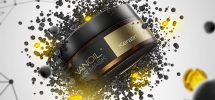It’s said that every hair type can be treated with oils. That’s why I decided to run a test on myself whether this principle applies to my oily hair too. The results of my experiment appear to be pretty positive, therefore I’m going to share my findings with you. Additionally, I’ll tell you which mistakes in hair oil treatment you shouldn’t make and how this beauty treatment affects oily hair.
Hair oil treatment: The most effective method & how to choose an oil
When it comes to hair oil treatment, the most common way of carrying this procedure out is on dry hair. What does that mean? In short, this technique depends on applying an oil to dry and pre-washed hair to remove it with a shampoo later. However, in terms of oily hair, combining an oil with a conditioner seems to be more beneficial solution. First, you have to dampen hair with water and then follow with a conditioner and oil. This manner of application improves the moisture level in hair.
It you are more into carrying out hair oil treatment on dry strands, then remember to emulsify the oil with a conditioner. Before removing the oil with a shampoo, massage a conditioner into strands first. In this way, you will follow the principle saying that ‘grease removes grease’. Also, make sure that you use the adequate amount of the oil. Otherwise you may experience some problems with removing it later. If your hair is oily, apply just one spoon of an oil.
Another key issue when talking about applying oils to oily hair is selecting the right beautifying oil. I advise you to give a try to: coconut oil, rice oil, olive oil or create a blend of oils. On the other hand, stay away from the following oils: linseed oil, soy oil, hemp oil and castor oil.
Applying oils to washed hair
Is applying oils to hair that has just been washed a good idea? I guess I’ll surprise you saying that even oily hair needs this type of treatment. However, in this case, an oil should be applied to hair ends only to prevent splitting and damage. Again, make sure that the amount of oil is really tiny. Similarly do this with hair mists – choose moisturizing mists (contain humectants).
Do you know that…
… when carried out regularly, hair oil treatment reduces production of sebum? In other words, if you choose the right oil and use it correctly, then you may expect your scalp to become less oily with time. How is it possible? In most cases, seborrhea is the reaction of skin to excessive dehydration. To clarify, sebaceous glands produce more sebum in order to lubricate skin and hair. As you can see, natural beauty oils are able to balance the work of sebaceous glands.



